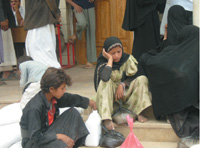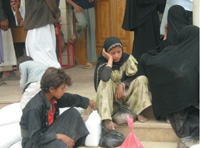
With internal displacement increasing, Sa’ada faces a humanitarian disaster [Archives:2008/1155/Reportage]
May 15 2008
 |
amel11ariqi@yahoo.com
Many relief agencies warned that the number of internally displaced people in Sa'ada, which is witnessing heavy fighting between the Yemeni government and Shia rebels, is increasing, creating a real humanitarian crisis.
“In the last few days, Sa'ada town and immediate surroundings received more than 15,000 people,” said Eman Mo'ankar, communications delegate for the International Committee of the Red Cross (ICRC). She confirmed that thousands of civilians are fleeing their homes in areas that are witnessing fighting to seek a safe refuge where they can be assisted and cared for.
So far there have been few reports about these displaced people as national and international media have difficulties getting access to their locations. However, relief agencies working in the area revealed that the living conditions of the population affected by the conflict have been deteriorating. There has been near-constant fighting in Sa'ada for the last four years.
“The situation is very dramatic and we afraid that the number of these people who flee the conflicts will increase, which means more need for urgent humanitarian assistance,” said Dr. Essam Al-Din Awwadh, the director of Sa'ada relief project in the Charitable Society for Social Welfare, or CSSW.
According to CSSW, all of Sa'ada's 15 districts, which are inhabited by a population of 70,000, are being affected by this war. It is estimated that more than 45,000 people- the majority of them are children and women- have been forced into internal displacement. At least 20,000 children have settled with their families at camps near Sa'ada city, while others families are still scattered all over Sa'ada districts such as Sahar, Majz, Al-Zaher, Shida'a, Baghim and Haidan districts.
“There are three camps to receive these people,” said Awwadh. “The population of these camps are not fixed yet, as most of them [internally displaces persons] left to resettle at their relatives' houses.”
“The camps still receive more refugees, so it's not easy to estimate the three camps populations,” he said. Awwadh added that the three camps' residents have access to aid from organizations affiliated with the United Nations like UNICEF, the World Food Programme and ICRC. These agencies address the refugees' needs by providing them with shelter and emergency aid.
In the three camps, the ICRC, in cooperation with the Yemeni Red Crescent Society, provides clean drinking water on daily basis to around 5,000 individuals by either trucking water into the camps or maintaining diesel supplies to operate water pumps. In addition, showers and toilets were installed to serve the needs of the camps' populations.
“In Sa'ada there other types of refugees. They are those who cannot reach the camps and build their own tents and shelters in the valleys or on the mountains – and some of them in the middle of roads,” said Awwadh. “You can see such gatherings of these displaced people in Al-Marahidh area.”
Those internally displaced people [IDPs] that choose to make their settlements outside of the camps have no access to aid and live miserable conditions.
According to ICRC, more than 100,000 people directly affected by the war are in critical need of humanitarian aid.
They are living in precarious conditions where the majority of them suffer from food shortages, poor sanitary conditions and limited access to medical care.
In addition, most of internally displaces people come from poor working class backgrounds and left their homes with few or no belongings at all.
“The coping mechanisms of the affected people include sale of assets, borrowing of food and food abstinence. Though some food is available in the market, price increases and weak purchasing power limit access to it,” said the World Food Programme's recent summary of operations in the Sa'ada area. The World Food Programme [WFP] is one of the few agencies that have been allowed constant access to the region.
According to the latest UNICEF surveys, the nutritional status of the Sa'ada children is fragile and most of them are suffering from acute, severe or at least moderate malnutrition.
“In the past children suffered from diarrhea. The situation now is better with the sanitation system that ICRC provided to the camps,” said Awwadh. “However, the children may be at risk during the rainy season, which started in May. Diseases like typhoid, pneumonia, flu and diarrhea are expected.”
The drugs that UNICEF and CSSW provide are simple, consisting of basic medicines and vitamins.
According to a recent report released by the Yemen Human Rights Observatory (YHRO), citizens in Sa'ada suffer human rights abuses and poor security. Epidemics and communicable diseases proliferated throughout the governorate and students are absent from schools.
The report said that 110 homes were changed into barracks and havens for army personnel, 74 homes were partially damaged and 79 have been completely destroyed. Even mosques, health units and schools were damaged or transformed into military barracks.
“The ICRC is concerned with the security and the living conditions of the population affected,” said Mo'ankar. “As thousands of civilians endure the consequences of the conflict, away from their lands and usual livelihood, they are becoming increasingly dependent on humanitarian assistance.”
Mo'ankar added that the IDPs are not able to carry out normal lives; they have poor access to health services, clean drinking water and food, which in turn is causing a heavy burden on the civilian population, host communities and returnees.
The displaced people hosted by other families in Sa'ada city put an added burden on the city's limited resources, according to the ICRC, which had to support the city with a donation of a generator in Sa'ada city last year.
Water tanks were provided and filled twice daily for 2,400 returnees in Al-Asaifi and Al-Aredah villages. In 2008, water pumps were installed in these two locations to replace the water trucking.
UNICEF & CSSW are also implementing a project to decrease child mortality by reducing malnutrition and by providing better quality health care delivery services in targeted areas of Sa'ada governate. The program will help treat 1,500 children who are under five years old.
Besides the emergency relief, organizations like the CSSW are providing training to volunteers and resident health workers of Sa'ada governorate on how to manage malnutrition cases, particularly in emergency situations in local communities.
Still, the emergency aid reaching those affected by the Sa'ada war is conditional upon the security status of the area. According to the agencies working there, the continuation of the conflict will reduce access to the beneficiaries and cause additional displacement.
“I have heard that many of these aid shipments get robbed on their way to the victims,” said Awwadh, who added that he thought the IDPs who have no access to aid are likely to be the looters of such shipments.
In its part, the ICRC appeals to the warring parties to respect and adhere to the provisions of international humanitarian law, which makes a distinction between civilians and fighters participating in hostilities. “The ICRC is constantly appealing to protect the civilian population and to treat all wounded civilians and fighters with humanity,” said Mo'ankar. “The population affected by the conflict is still in dire need of humanitarian assistance.”
“Every necessary measure must be taken by the parties to guarantee the free movement of humanitarian workers for them to be able to have timely access to all those in need in all areas,” she added.
“The affected people do not hide their concerns about the future,” reported Awwadh. “They are wondering if they can ever find security again.”
——
[archive-e:1155-v:18-y:2008-d:2008-05-15-p:report]


